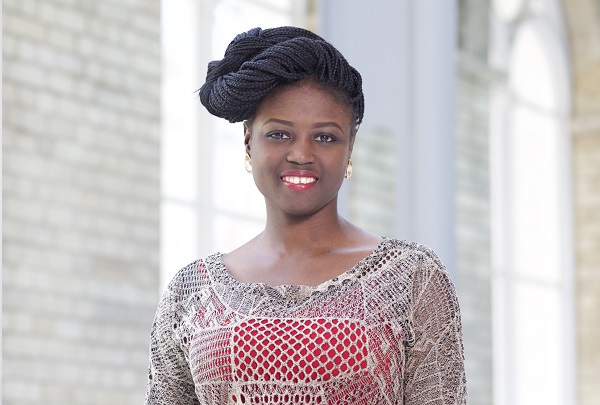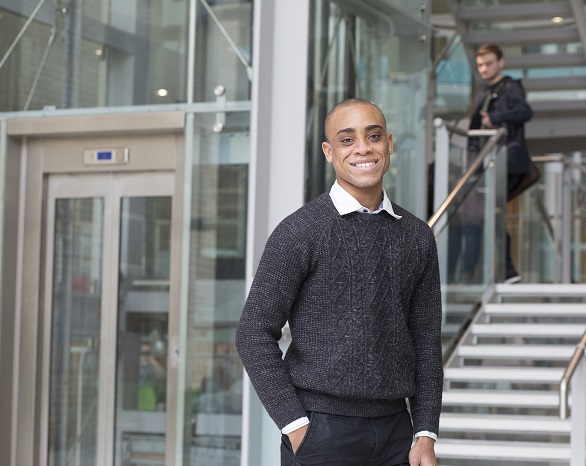
The MSc Economics degree exposed me to the use of software and its importance for economic planning and modelling purposes.
More about Sangjat
I previously studied BSc Economics at the University of Jos in Nigeria, graduating in 2013. I then completed my youth service (NYSC) at the Government Girls’ College in Zonkwa, Kaduna State where I also taught economics.
I wanted to study a master’s degree as it was the right next step for my career plan. I had just finished my NYSC and wanted a qualification that would distinguish me from other graduates back home in Nigeria. It’s a very competitive job market.
Studying in Nigeria is difficult, there are a number of issues affecting students, especially around strikes and unpredictability so I wanted to look at the United Kingdom where there is an established history of good universities and stable student learning environments.
Why Nottingham Trent University (NTU)?
My cousin recommended NTU to me. She knew someone who had studied here and really benefitted from the experience. Researching NTU I found that the Nottingham Business School (NBS) was amongst the top 5% of business schools in the world. I really appreciated the service provided by the NTU team. They were really quick to assess my documents and to make me an offer within two weeks of applying.
Why MSc Economics?
The MSc Economics modules covered an impressive breadth of topics and aligned with what I wanted to learn and achieve from my Master’s degree. The most relevant module for me was Contemporary Issues in Economics as I want to help develop policies that will positively impact my home country’s economy.
What I found really useful was the opportunity to work on real, current issues to test the economic theory we had learnt in our seminars. For example, I worked on a case-study related to the multi-billion High Speed Train Development project (HS2) in the UK. I was tasked with developing a cost benefit analysis of the project and presenting my findings in the form of an academic report. Something I hope to be doing in my future career. It was this type of real-world focus which enabled me to put theory in to practice as an economist.
In addition, the MSc Economics degree exposed me to the use of software and its importance for economic planning and modelling purposes. I didn’t have experience with using software during my bachelor’s degree, so this has opened up a completely new and useful skillset for me.
What skills have you developed?
The most important academic skills I learnt are focused on econometrics and model specifications. For example, how to create and explain economic models and how to apply them to practical situations and policy development.
I would say my greatest achievements were making friends with people of diverse backgrounds from all over the world and developing my self-confidence. Back home I found that the education system didn’t encourage self-reflection and critical thinking but they are skills I have developed here.
Seminars & lectures
What impressed me was the amount of interaction involved in my seminars and lectures. Having a small class of 12 students from all over the world fostered good, constructive debates with diverse opinions. It provoked me to consider different approaches and ways of looking at economic issues that affect my home country.
In my future career I want to help Nigeria diversify its economy so that it is not so reliant on oil. The modules, interactions and skills I have learnt here have been important in shaping my philosophy on achieving that goal.
I also had a great relationship with my course professors who I found friendly, approachable and helpful. This was really different to what I experienced back home and it was a big, positive difference for me.
I found that my academic development was complemented by NTU’s Boots Library which is open 24 hours a day and has great access to the computers, software and journals I need for my degree.
Scholarship opportunities
I applied for a scholarship with the support of the NTU Africa Team. I really appreciated that NTU’s scholarship applications do not solely focus on your academic achievements but also your skills, experiences and passions. I was successful in receiving a scholarship worth 50% of my tuition fee so it really is possible to get one!
Career plans
When I graduate I want to work in a role where I can have a positive impact on my country; somewhere like the Central Bank of Nigeria. Thanks to my MSc Economics degree from Nottingham Business School, my career plans are definitely going in the right direction. I would recommend students get in touch with the team here at NTU as they are open and happy to help.
Life in Nottingham
Nottingham has a vibrant Nigerian community which helped me to settle in when I first arrived. The Nigerian Society helped me out with how to source some of the home comforts I was missing and in finding my church. I attend the Redeemed Christian Church of God here in Nottingham. In addition, I am a Student Ambassador with NTU, meaning I get paid to work part-time for the University at Open Days and Call Campaigns.
Still need help?
-

STUDENT PROFILE
Anshuman Das
EconomicsIndia
https://www.ntu.ac.uk/study-and-courses/courses/our-students-stories/business/anshuman-das
-

STUDENT PROFILE
Basel Saadia
Economics, Banking and FinanceMiddle East, not otherwise specified
https://www.ntu.ac.uk/study-and-courses/courses/our-students-stories/business/basel-saadia
-

STUDENT PROFILE
Bernard Kofi Dom
Finance and AccountingGhana
https://www.ntu.ac.uk/study-and-courses/courses/our-students-stories/business/bernard-kofi-dom